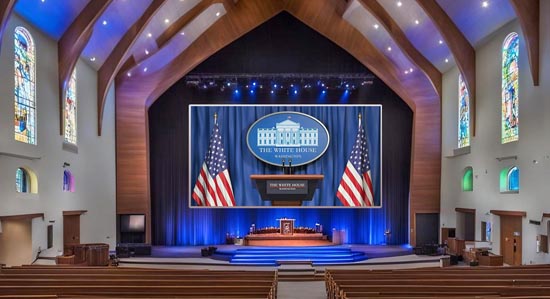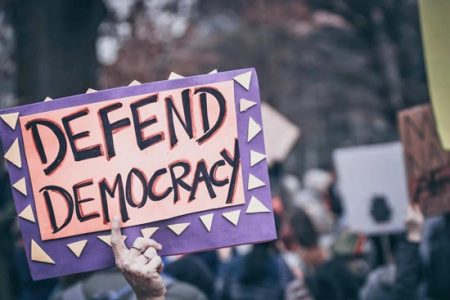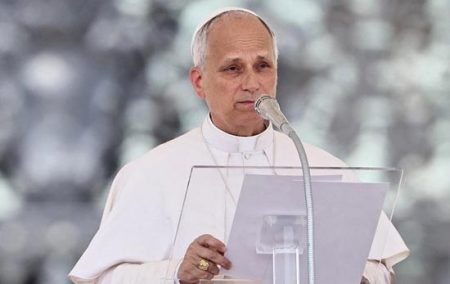The Heart of the Issue: Separation of Church and State
Some specific unanswered questions and issues.

Lately, there’s definitely been some tension surrounding churches endorsing political candidates while trying to maintain their tax-exempt status.
The issue of churches mixing politics with religion is a hot-button topic that has been a source of debate for decades, especially when you bring in the IRS’s guidelines on tax exemption.
The idea is that, under the First Amendment, there should be a separation between government and religion. Churches, as tax-exempt entities, are not supposed to take a partisan stance in elections or publicly endorse candidates, because this could blur the lines between state and religion. If a church endorses a political candidate, it could, theoretically, lose its 501(c)(3) status.
However, how this is enforced and interpreted has created a huge gray area.
How Much Political Activity is Too Much?
The IRS prohibits “substantial” political activity by churches, but it’s vague about what constitutes “substantial.”
For example, is a sermon about voting or a candidate’s policy positions considered partisan? How about a pastor endorsing a candidate from the pulpit?
Historically, the IRS has rarely revoked a church’s tax-exempt status over political activity, leaving many religious leaders unsure about what’s permissible. Case in point: In 2008, some churches participated in “Pulpit Freedom Sunday,” where pastors intentionally defied IRS rules by endorsing candidates. The IRS didn’t take significant action against them, which prompted further confusion about the enforcement of these rules.
What About Social Justice Issues?
Some argue that certain social justice causes and movements (civil rights, poverty alleviation, etc.) can be seen as political stances, even if they are based in religious teachings.
So if a church is deeply involved in promoting social justice causes, is it engaging in political activism? Is that a violation of tax-exempt rules?
The gray area here is how “political activity” is defined. Some churches take a strong stand on issues like abortion, gay marriage, or immigration reform, which may be based on religious principles but still have strong political implications.
What About Political Action Committees?
Some churches have attempted to bypass the rules by setting up Political Action Committees (PACs). This is a tricky area because while a PAC can endorse candidates, it can’t be directly tied to the religious organization, or else the church risks losing its tax exemption.
So can a church affiliate indirectly with a PAC without facing consequences? If the church leadership is deeply involved in the PAC’s actions, is that considered a violation?
Are We Seeing a New Era of Political Engagement?
More and more churches, particularly among evangelical communities, are openly endorsing political candidates or encouraging their congregations to vote for specific political parties or platforms.
Many have closely aligned themselves with certain conservative politicians over issues like abortion and same-sex marriage. This has created a blurring of the lines between religious doctrine and political agendas.
The rise of faith-based voting blocs has further complicated the issue. If churches deliberately try to influence how their congregants vote, is that crossing the line into political campaigning?
Should Churches Be Held to the Same Standards as Other 501(c)(3) Entities?
Other nonprofits and charitable organizations that fall under 501(c)(3) must comply with strict rules about political activity. Should churches be held to the same standards, especially considering the growing involvement of faith-based organizations in politics?
Critics argue that churches often have more latitude than other nonprofits, which feels like an unfair advantage—particularly when churches have the ability to influence elections based on the power of their congregational reach.
The Johnson Amendment
A key piece of legislation in this debate is the Johnson Amendment, which, since 1954, has banned tax-exempt organizations from endorsing political candidates. Some churches have been vocal about wanting this amendment repealed, arguing that it restricts their freedom of speech and expression.
In 2017, President Trump signed an executive order to “ease” restrictions on religious organizations engaging in political speech, although it didn’t eliminate the Johnson Amendment itself. This order created a surge in political rhetoric from some churches, but it didn’t legalize candidate endorsements.
What’s at Stake?
Tax-Exempt Status: If churches cross the line too much into political activity, they risk losing their tax-exempt status. The loss of this status could result in substantial tax liabilities, both for the organization and potentially for its donors.
Public Perception and Trust: Many people believe that churches should not be involved in political campaigns because they’re meant to be neutral spaces that focus on faith. When churches take political sides, they risk losing the trust of some members who feel they’re being used for political purposes. Will churches risk endorsing a single candidate, or endorse all candidates walking through their doors, without fear of losing major funding?
Legal Precedents: Every time a church steps into the political arena, it can create a legal precedent for future cases. If the IRS doesn’t enforce the rules consistently, it leaves a big gap for confusion in future cases.
Our Thoughts?
It’s a complicated issue. There’s a fine line between being “socially active” in ways that reflect religious teachings (such as advocating for the poor, the oppressed, or marginalized communities) and crossing into “political endorsement(s).” It seems the IRS could do more to clarify its rules and provide clear guidelines, particularly as some religious leaders push the envelope.
From a broader perspective, I think the issue touches on larger debates about the role of religion in public life—especially in an increasingly polarized political climate. If churches want to wield political influence, they should be held accountable for how they wield that power, just like any other organization.
What Do You Think?
Do you feel churches should stay out of politics entirely, or do you think they have a right to advocate for political causes based on their beliefs?
Reach out to The Urban News with your well-thought-out views and let us know what you think. Email [email protected]








